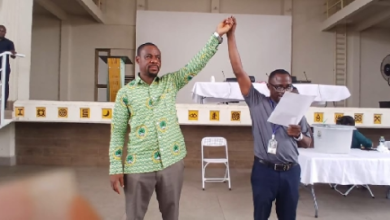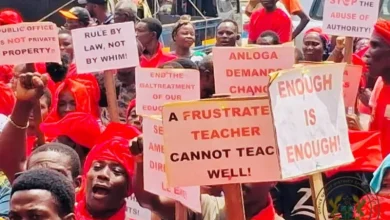
Teachers and Educational Workers Union (TEWU) is calling on government to review the ratio of sharing ‘intervention money’ for teaching and non-teaching staff at senior high schools in the country.
The percentage ratio for disbursement of money for two categories of workers presently stands at 80 to 20 percent for teachers and non-teaching staff, respectively.
But the Leadership of TEWU say the introduction of Free Senior High School and Double Track system has increased the burden them without corresponding compensation.
Addressing the 12th Quadrennial National Delegates’ Conference and 60th-anniversary celebration in Kumasi, TEWU Chairman, Peter K. Lumor, says government is, in addition, paying only 20 percent of overtime work done.
This for him is demoralising.
Educational sector performance report in 2018 confirms secondary education recorded enrolment growth from 758,465 (8.8 percent for private) in 2011/2012 was private schools to 1,008,237 (6.1 percent for private) in 2016.
As a result of the implementation of Free SHS and Double Track, the numbers have increased almost by additional 100,000 a year since 2017/2018 academic year, though the association commends government for taking such a bold initiative.
“These increased numbers has brought with it increased workload on the members of TEWU (the non-teaching staff of GES) without the necessary compensation. What is even worrying is as if the non-teaching staff do not matter. All discussions and interventions are towards teachers.
It must be noted that without the non-teaching staff, the wheel of these policies would grind to a halt. We are calling on Government, as a matter of urgency, recruit more non-teaching staff to lessen the burden on the current staff,” Acting General Secretary of TEWU, Mark Dankyira Korankye, said.
INTERVENSION MONEY
Acting General Secretary of TEWU, Mark Dankyira Korankye, says this is unfair in that, “Teachers who are on the time-table and are not there always in the school are given 80 percent whiles our members who do not go on leave and are there 24hours were given only 20 percent”.
“We also call on government to look into the sharing of intervention money released to the school and give the non-teaching staff what is right. We shall not accept what was given the last time in the ratio of 80-20 percent. We deserve more than that. If it cannot be 50 – 50 percent, the worst-case scenario should be 60 (teaching) – 40 (non-teaching) percent.”
According to him, the national council of leaders of TEWU, have issued statements asking government to address the issues by September, 4, else they advise themselves but they are worried again, government has pretended they are not hearing us.
OVERTIME PAYMENT
Chairman of TEWU, Peter Lumor, wants serious attention given to general service conditions for TEWU members.
He reveals their conditions of service are being tampered with by the government, which he describes as unfavourable and unbearable because “they are pushing us to the wall”.
“How can you tell me that, though my conditions of service say I should not work overtime 72 percent of my salary, no matter the hours of work we do, they will pay only 20 percent as overtime.
Mr Lumor worriedly adds that, “Please let’s go to the table, we will not work more than the amount of 20 percent you pay. If you want us to work up to 20 percent, we will work 20 percent and go home.
The Labour ACT 651 is very clear how overtime must be paid, you negotiate with me and tell me how much you will pay. You don’t impose any amount on me and expect me to work overtime. We are ready to advise ourselves.”
The theme for the conference is, “60 years of TEWUs contribution to the development of equitable, inclusive, and quality education delivery in Ghana”.
OTHER ISSUES
Other issues under discussion at the conference include critical support, the abolition of GES/SIC Insurance Scheme and the new University Bill.
Critical Support is one item which has been on the tables for a long time. For almost 9 years now, they are still struggling to get this allowance paid to all our members.
“Can we say that somebody’s work in the GES (especially those in the Senior High Schools) is not important and for that matter should be denied this allowance? “.
Mr Korankye pleaded with Government, as a matter of urgency, take steps to have this matter resolved.
“We are asking the Government through the FWSC to expedite action on the various conditions of service for our various constituents (i.e. the GES, public universities, technical universities, colleges of education, WAEC, Library Authority, Museums and Monument board), complete them and have them signed as early as possible so that all monetary issues would be factored into the budget for next year. This will ensure industrial peace and harmony at the various workplaces. There is also the need to look at the salary levels of our members, especially those in the lower brackets so they can also earn a decent salary.”
Meanwhile, the Deputy Employment and Labour Relations, Bright Wireko Brobbey, says the issues will receive attention from relevant authorities.
The conference ends on Friday, with the election of new to steer the affairs of the union for the next four years.
Source: Ghana/otecfmghana.com




